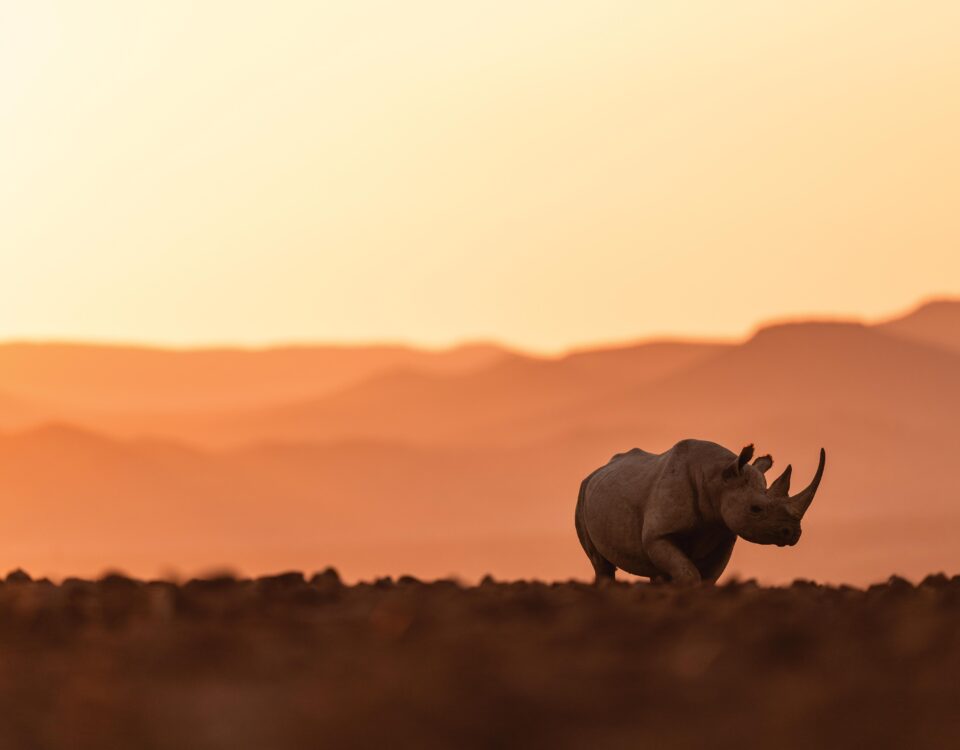The secret of the fairy circles uncovered
April 29, 2013Big Rewards at Little Ongava – Etosha, Namibia
April 30, 2013Compiled by Jana-Mari Smith
In March, a team from Travel News Namibia walked in the footsteps of the Namibian black rhino in the Kunene region, an exhilarating, once- in-a-life time opportunity. This special trip was made possible by the Save the Rhino Trust Namibia, whose hard work and dedication enables Namibia to boast the largest free-roaming black rhino population in the world. Moreover, the best news of all is that this population of black rhinos is on the increase.
Some fast facts about the black rhino in Namibia:
- All black rhino in Namibia are classified as Diceros bicornis bicornis or the South western subspecies of black rhino
- The difference between the desert-adapted black rhino of the Kunene Region and other rhino in Namibia is that the Kunene version has adapted superbly to this taxing wilderness with its scarce water resources.
- Kunene rhino typically go to water every 2 to 3 nights , whereas elsewhere black rhino drink every night.
- These rhino feed on an estimated 74 plant species. Their favourite food includes the candelabra euphorbia, Euphorbia virosa, and the plains euphorbia, melkbos or Wolfsmilch, E. damarana, both of which grow extensively in the area.
- The desert-adapted black rhino has the wayward reputation of feeding on the nationally protected Welwitschia mirabilis plant. But rhino scientists and trackers assure us that they only nibble on the small parts of the leaves and cause no permanent damage to the plants or their seeds..
- Black rhino calves in the Kunene region spend longer with their mothers than their counterparts that inhabit the more hospitable parts of Africa where there is more for them to eat and drink. In the harsher Kunene environs this period extends to around two and half to three years, which gives them the opportunity to learn the necessary survival techniques, especially the whereabouts of permanent springs, before they are weaned and left to fend for themselves.
- Although black rhino are typically solitary animals, observers have noted that in the Kunene Region calves, especially female, periodically rejoin their mothers.
- Grown males can weigh as much as 1 000 kilograms
- A rhino’s home range in the Kunene region varies from 34 to 790 square kilometres with the average range being 175 square kilometres.
The successes of rhino conservation in Namibia aside, the SRT depends entirely on donations.
Here are some ideas how you can help preserve the black rhino in Namibia – and remember, whether big or small, any donation helps.
- You can donate as an individual, but remember group efforts are powerful. Ask family, friends or colleagues to start a collective fundraising effort.
- Be creative, and have fun while collecting funds for the rhinos. Bake and sell cupcakes, host a fundraiser, organise a charity dinner, take photographs, paint a picture and and sell them. Bake banana bread, paint plant pots. Mix and mingle your creative talents with your charity drives.
- You can choose to be part of SRT’s ‘Sponsor a rhino’ programme. Contact them directly for more information.
- Help the trackers. SRT needs funding for uniforms, binoculars, field rations and other equipment for the field.
- Arrange a regular debit order, so that the SRT is assured of a small donation each month from you or a group of people.
- Remind your boss of the social responsibility programme at your business. Perhaps they can make regular donations or match any employee donation..
- Word of mouth. Remind people of the hard work of the SRT and that they depend entirely on funding.
- Make a once off donation of equipment needed by the SRT.
- Agree to fund or partly fund regular expenses such as office stationery, computers, fuel etc.
Once you have donated, tell your friends, family and colleagues and encourage them to do the same. SRT’s fundraising manager Sue Wagner will advertise all donations on the SRT website and/or Facebook page. This could be your few minutes of fame.
Contact the SRT at 064 40 3829 or mail them at [email protected]



